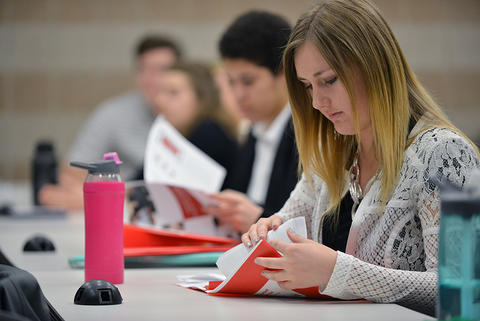
Developing the Next Generation of Fundraisers
Friday, September 1, 2017
Stay updated on the future of fundraising with Carlson School. Discover insights and strategies for developing the next generation of fundraisers in this informative article.
A lifelong love of the arts and several fulfilling internships set Erin Vogel, ’18 BSB, on her current career trajectory: nonprofit work with locally focused arts organizations.
“I just really love being able to apply my business skills to a mission-driven setting,” says the Marketing and Nonprofit Management major, who grew up singing, playing the tuba, and tap dancing in Sioux Falls, S.D.
But when she started an internship at the Hennepin Theatre Trust, she waded into an unfamiliar and ambiguous-sounding area of work: “development.”
“I was like, is it construction or something?” Vogel jokes.
Not quite.
Development is the broader, more approachable term that encompasses the world of fundraising. And if Mike Fiterman, ’70 BSB, and his wife, Linda (a graduate of the College of Education and Human Development), have their way, more and more Carlson School students will learn about the field—and build the skills to succeed in it.
The longtime philanthropists supported the creation of a new course, Philanthropy and Fundraising Strategy, which launched in the spring semester, as well as scholarships for Nonprofit Management majors.
“When you speak to leaders within the nonprofit community, this is an area where they are really trying to recruit,” says Anne Cohen, a senior lecturer who teaches the course as part of the Carlson School’s Public and Nonprofit Management major.
“They’re realizing that many of their best fundraisers—those with lifelong passion and experience with their causes—are aging out. Within the next 10 years or so, they’re going to be retiring.”
Listen and learn, then apply
Enter students like Vogel who are passionate about a cause and interested in the nonprofit world. The course introduces them to big-picture concepts—defining key terms such as planned giving, capital campaign, and stewardship is one of the early tasks—with the help of guest speakers from across the development spectrum. This spring’s lineup included the likes of Mia Hoagberg (president and chief executive officer of Make-A-Wish Minnesota), Stephanie Donley (senior major gifts officer at the Minneapolis Institute of Art), and Mort Naiman (associate vice president of global philanthropy for the Jewish Agency for Israel).
“I wanted to have people who were real content experts, the real superstars who can come in and give (students) the greatest insights possible from a lifetime of experience,” says Cohen.
And the students have the opportunity to put those words of wisdom into practice immediately through a real-world fundraising consulting project on behalf of what Cohen calls “an emerging nonprofit”—one that is still forming its development strategy. The inaugural project sponsor was Rêve Academy, an educational and entrepreneurial organization created by Carlson School alumni Kristin Pardue, ’98 MBA, ’07 Executive Leadership Program, and Brad Von Bank, ’02 MBA.
The Academy, a nonprofit outgrowth of Rêve Consulting that started in North Minneapolis, partners with schools to expose students to practical, sought-after digital skills and offers internships through student-run businesses. But, with a full-time staff of three, “we’re incredibly busy with a million competing priorities,” says Executive Director Amanda Janssen.
Both sides benefit
Cohen’s class analyzed Rêve Academy’s current fundraising tactics, splitting into four teams to cover the distinct development components of annual fund, capital campaign, major gifts, and planned giving. The students heard from Janssen, visited Rêve’s office in Northeast Minneapolis, and traded numerous emails with Eliza Wright, the organization’s director of marketing and operational excellence.
By the end of the seven-week, B-term course—“a crash course in fundraising,” in Vogel’s words—each team had crafted a fundraising planning package pertaining to its assigned area and delivered a presentation for Janssen and Wright. The students proposed enhancements to an existing donor event, sketched out a communications plan for promoting planned giving opportunities (deferred gifts through a will or other means), and recommended customer relationship management software, among other ideas.
“I was really impressed by the comprehensiveness of the students’ work. … I walked away with this excitement about strategizing in the area of fundraising,” says Janssen, who told the class, “This directly impacts what we can do with kids and how many kids we can serve,” after the final presentation.
"This directly impacts what we can do with kids and how many kids we can serve."
“We don’t have a full-time fundraising team right now,” adds Janssen, “so being able to partner with the Carlson School was a huge asset for us.”
And, based on the feedback Cohen got from the first cohort of students to take the class, the experience was worthwhile for them, too. Vogel says the course cemented her interest in pursuing a career in nonprofit fundraising. Charlie Thomsen, ’17 BSB, who took the class to complete his Entrepreneurial Management minor, says he came away with “a whole new appreciation for fundraising and nonprofits.”
“Coming into the class, I had limited experience with the nonprofit sector. I never realized there were so many different approaches to fundraising,” says Thomsen, who now hopes to one day serve on a nonprofit board.
“Development officers are definitely unsung heroes who are critical to helping make positive change all over the world.”
